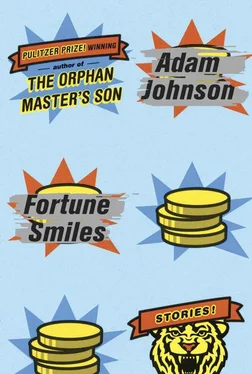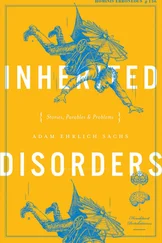They crossed the Imjingang and parked with a hundred tour buses at Dorasan Station. The air smelled of diesel and carnival food. They made their way through masses of tourists toward the observatory, where they approached a bank of binoculars. Together they beheld North Korea: Mount Songaksan, the Gaeseong Valley and the collective farms at Geumamgol, where several oxen were pulling something unseen through tall brown grass.
“Look at those peaceful meadows,” Sun-ho said, dialing in the focus. “Doesn’t it look like you could just walk home?”
DJ turned from the view to his friend. “Yeah,” he said. “Except for the seven million land mines, you could take a nice stroll.”
A group of high school boys approached and leaned their backs against the parapet. They were young and handsome and maybe were making fun of Sun-ho’s balloons. In general, they seemed more interested in eating fried sweet-potato balls than gazing upon the North.
Sun-ho bristled at their arrival. He’d taken offense at teens in uniforms, and he seemed to take even more at students without them. He peered into his binoculars. “Imagine how stupid we must look to our countrymen,” Sun-ho said. “Imagine what real Koreans think of our sequined ball caps and manga shirts and K-pop footwear.”
When DJ panned the countryside, he saw only peasants in wintertime, laboring in heavy canvas coats. He saw packed-clay roads and corrugated metal roofs. No cars were visible, let alone freeways or hospitals or people contemplating South Korea.
“No launchings,” they heard someone shout. “No launchings.”
They turned to see the black-and-white helmets of border guards moving through the crowd. Working quickly, Sun-ho stuffed Willow’s burger in a plastic shopping bag, hitched the handles together and secured a knot.
“No launchings,” a soldier shouted.
Then Sun-ho let go. The balloons raced at great speed across the windswept fields. After clearing a stand of trees, the cargo rose high into North Korean air.
The soldiers arrived, barking. “Who launched that contraband?” they demanded.
DJ and Sun-ho were silent. The teens beside them were silent.
The soldiers stared at each face before moving down the observation line to question others. When they were gone, Sun-ho approached the boys. He spoke to the tallest one, who must have played basketball. “You’re loyal,” Sun-ho said. “I like that. You weren’t afraid of those South Korean soldiers. Yes, your mind is strong. But you must tell me, I must know — why do you dress yourself like that?”
The young man offered a bemused smile.
“Look at your friend,” Sun-ho said, pointing at another young man. “He’s dressed like a pop singer. And the other one is wearing eyeliner. Do you know what makeup is for? Makeup is for foreign girls who are kidnapped to Pyongyang to be whored out to Party officials.”
The young man’s smile went away.
“You are Korean,” Sun-ho said with disdain. “Koreans defeated the Jurchens. Koreans fought off the Manchu. We repelled the Mongol invasions. Six times the Mongols tried to conquer us, and six times we prevailed.”
“Enough,” DJ said. “These are just kids.”
For Sun-ho, it wasn’t enough. “We beat the Japanese,” he said. “We took them at the Siege of Jinju, at the Battle of Okpo, and we swept them from the forests of Taebaek in ’45. We even whipped the Americans!”
“The Americans?” The young man laughed. “You crazy ajeossi . We never fought the Americans.”
That was when Sun-ho took a swing upward, toward the young man’s throat.
DJ jumped between them, but someone grabbed his back and rode him to the ground. He felt an elbow around his throat and smelled the junk-food breath of the boy who choked him out. When he came to, he was on his hands and knees, Sun-ho patting him on the back. The boys were nowhere to be seen.
“There you go, you’re back,” Sun-ho said. “You were only gone a few minutes.”
Saliva ran from DJ’s mouth. He could feel grit pressed into his cheeks, and both eyes were trying to stream clear.
Sun-ho said, “It feels good to fight, doesn’t it?”
DJ tried to say no, but a kind of retching sound came instead. He blinked and looked down at the pavement, dark with spit.
“What happened to our country?” Sun-ho asked. His voice sounded philosophical and faraway. “How did this happen to us?”
“You don’t belong here,” DJ said. “I get that. But there’s no way to take you back. You have to start adjusting, you have to accept that things are different here.”
“I’ll tell you where we belong, Dongjoo,” Sun-ho said. “We were made for another time, one before all this, when a man had a wife, some kids, and lived out his days in the village of his birth. In the summers, a man’s family would feast on what his war pony could carry home. In winter, they’d huddle to keep warm.”
Sun-ho helped DJ to his feet, steadied him.
“You can’t just attack people,” DJ said. “Life is different here.”
Sun-ho ignored this. “What does a man need?” he mused as he brushed the dirt from DJ’s clothes. “Some heat under his floor, a woman he comes to love, the ram’s-horn bow he inherits from his father? We should have been born before this mess, Dongjoo. What I wouldn’t give to live a thousand years ago. I’d serve a Goryeo king. I’d live a life of honor. If your growth was stunted back then, it was due to crop failure, not a dictator who steals your food. If your hip got broken, it was the work of an ornery ox, not the fucking secret police.”
DJ said, “I would take you back if I could.”
Sun-ho took a last glance northward.
“Nonsense,” he said, and clapped DJ once more on the back.
—
Mina let DJ hear her play. They worked their way along the Daehwa-bound Orange line, playing accordion in the Apgujeong, Oksu and Geumho stations. Mina tended to close her eyes when she played, allowing DJ to watch how she leaned back to fill the bellows, the way her right hand was light on the piano keys and her left punched through the registers. The tunes were less patriotic today. When she played “Hwiparam” in Yaksu Station, an unseen man whistled along from deep within the tunnel. “Rainbow Bridge” brought forth a woman who’d defected from Hamhung and now had a stall in the market selling Northern-style tofu. Following “Bangeap Sumnida,” a fellow from Nampo approached. He sold icy bowls of naengmyeon from a little cart. “You two are new, I can tell,” he said, and tossed some won in the accordion case. “Be patient. It takes a while, but Seoul will offer you her teat.”
When he was gone, they had a laugh about that.
The Dongguk station, it turned out, was beneath a soaring church clad in blue glass. Here, Mina sang the words to “Waiting for Him” as after-sermon parishioners made their way down to the trains. They formed a large circle as she sang, unaware perhaps that the “Him” in question wasn’t their beloved Yesu-Nim. When Mina thanked them and they heard her accent, money poured into her case.
When the crowd cleared, Mina took the instrument idly through its scales.
“The people at my meetings want me to give up the accordion,” she said.
DJ sat on the cool marble floor. He was still in the thrall of the song.
“Are you serious?” he asked.
“They say I’ll never accept the South while my music pays tribute to the North.”
“But what about your husband?” he asked. “Aren’t you on a mission?”
“They say if my husband were here, his name would have been recorded at Hanawon.”
Mina stopped squeezing the bellows, so the notes she fingered became only the soft clacking of buttons.
Читать дальше












